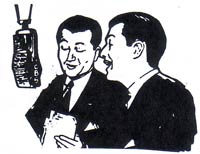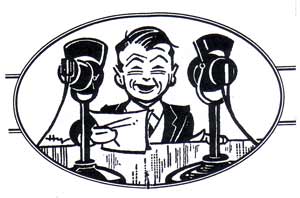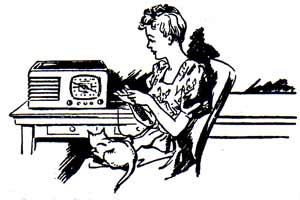|

This story was published in Radio Recall, the journal of the Metropolitan Washington Old-Time Radio Club, published six times per year.
Click here to return to the index of selected articles.
|
|
THE BROTHERHOOD OF THE AIRWAYS
by Jim Cox © 2006
(From Radio Recall, June 2006)
 Everybody recognizes the Dorsey Brothers, Marx Brothers, Andrews Sisters, McGuire Sisters, Pickens Sisters and the Lombardos from radio days. (Did you know there were five Lombardos performing with that family troupe?) There were other entertainers in the medium who were also flesh-and-blood siblings, although their connection may not have always been obvious. This introspective in no way purports to be exhaustive. Still it is an attempt to introduce several audio personalities that shared familial ties who might not have been readily identified by the general public. Everybody recognizes the Dorsey Brothers, Marx Brothers, Andrews Sisters, McGuire Sisters, Pickens Sisters and the Lombardos from radio days. (Did you know there were five Lombardos performing with that family troupe?) There were other entertainers in the medium who were also flesh-and-blood siblings, although their connection may not have always been obvious. This introspective in no way purports to be exhaustive. Still it is an attempt to introduce several audio personalities that shared familial ties who might not have been readily identified by the general public.
Don and Jim Ameche, sons of an Italian immigrant whose surname was Amici, emanated into show business from their birthplace of Kenosha, Wisconsin. Dominic Felix (Don) Ameche was the elder, born May 31, 1908 and was followed by Jim on August 6, 1915. Don ultimately gained two stars on the Hollywood Walk of Fame, one for his contributions to radio, the other for television. Conversely, Jim was to be branded as the original (1933-37) voice of radio’s compelling juvenile adventure series Jack Armstrong, the All-American Boy. Don, in fact—already established in Chicago radio—urged his younger kin to hasten to the Windy City and try out for the part of Armstrong once it was posted.
Both brothers performed in films—each as Alexander Graham Bell in separate manifestations of The Story of Mankind (Don in 1939; Jim in a 1957 remake). Sometimes they were in the same radio dramatizations, together or at differing times. Don became better known as an actor while Jim found announcing to his liking. The older sibling was a recurring thespian in The First Nighter narratives; he was also emcee of The Chase and Sanborn Hour with Edgar Bergen and Charlie McCarthy. During the 1950s Don was favorably typecast while playing opposite Frances Langford as the sparring married duo, The Bickersons. He acted in several dramas during television’s earliest days, too. Jim, meanwhile, was content to introduce radio’s The Amos ‘n’ Andy Music Hall, Big Sister, Lux Radio Theater and Welcome Travelers while portraying the lead in yet another aural adolescent tale, Silver Eagle, Mountie. He died February 4, 1983 at Tuscon, Arizona while Don passed at Scottsdale, Arizona on December 6, 1993.
For decades the Fleming boys have been a pair of unsolved mysteries for this author, raising more questions than solutions. The confusion stemmed from the fact that some vintage radio historiographers failed to acknowledge the connection between the two. Until this researcher spoke with Ed Fleming in early 2006, it hadn’t been positively confirmed that there was ever more than one Fleming. But indeed, Jim existed in similar capacities in the same city with the same network in the same epoch! The two hailed from Baraboo, Wisconsin; James F. Fleming was born April 23, 1915 and his junior, Edward J. Fleming, arrived June 27, 1918.
After two years at the University of Wisconsin, Jim transferred to the University of Chicago, graduating in 1938. He got into radio while at Wisconsin, sportscasting at Madison’s WIBA. Like Don Ameche earlier, he urged his younger kin to pursue radio. Ed followed his mentor’s footsteps: during his four-year collegiate career at Wisconsin he announced at Madison’s WHA. Jim took a job with WGN in Chicago before joining CBS in New York where he covered news and special events. By 1941 the siblings were both there, Ed arriving as a newscaster at WCBS, the network’s flagship outlet. Almost immediately he was hired by series producer Anne Hummert to narrate one of her venerated daytime dramas, Our Gal Sunday. With a pause for military service in the mid 1940s, it was Ed’s voice listeners heard the next 15 years reciting those memorable Hummert lines: Once again, we present Our Gal Sunday, the story of an orphan girl named Sunday from the little mining town of Silver Creek, Colorado, who in young womanhood married England’s richest, most handsome lord, Lord Henry Brinthrope. The story that asks the question: Can this girl from the little mining town in the West find happiness as the wife of a wealthy and titled Englishman?
Conversely, Jim was introducing another Hummert drama at the same time, albeit in primetime: Mr. Keen, Tracer of Lost Persons (1940-43), as well as a trio of daytime soap operas (The Goldbergs, John’s Other Wife, The Light of the World). He became a war correspondent for CBS stationed in Europe, the Middle East and Russia. He departed that web following the war’s end to supervise the radio and film sector of the government’s Marshall Plan. In 1949 Jim joined NBC, becoming the original newscaster for the premiering Today show on television (1952). Four years hence he produced the competition, The Morning Show, for CBS-TV. Jim’s crowning achievement, nevertheless, probably occurred between those high watermarks when he was tapped as executive producer of the debuting NBC 40-hour weekend radio marathon Monitor in June 1955. Jim died at Princeton, New Jersey on August 10, 1995.
Ed was a CBS Radio newscaster in the 1940s while supplying the interlocutor’s spiel on Our Gal Sunday and adding similar duties for the Hummerts’ NBC daytime drama Front Page Farrell (1950-54). From 1946 to the early 1950s he was a newscaster at WCBS-TV, departing for WPIX-TV in New York where he wore the hats of newscaster, sportscaster and children’s programming coordinator. From 1958-64 he was a news anchor at the CBS-TV outlet in Los Angeles, KNXT, and moved to a similar capacity at San Francisco’s KRON-TV (1964-67). He left broadcasting afterward to be an investment broker, a field from which he retired.

The Herlihys of Dorchester, Massachusetts presented an interesting contrast in radio broadcast veterans. Ed, born August 14, 1909, was exceedingly well known via a host of plum announcing assignments that kept him at the forefront of dual mediums. Younger brother Walter, five years Ed’s junior—who also went into network radio announcing—is today hardly remembered at all. The boys’ uncle was Fred Allen, one of radio’s legendary comedians, whose enormous success impacted the direction of his nephews.
Ed acted in stage productions while enrolled at Boston College and by 1932 was announcing at Boston’s WLOE. A succession of Beantown stations included WHDH and WEEI before he landed at NBC’s Radio City in New York in 1935. From then until he retired 63 years later he was a “studio workhorse” with the versatility required “to handle a broad spectrum of general utility chores at the NBC microphone, day and night” according to a pundit. For 42 years he maintained a commercial relationship with the Kraft Foods Company as its chief spokesman on radio and television. For 25 years he was the voice of Universal-International newsreels screened in cinema houses. The legions of radio series Ed introduced included The Big Show, The Kraft Music Hall, Life Can Be Beautiful, Mr. District Attorney, People Are Funny, Truth or Consequences, Vic and Sade and dozens more. He—or his voice—appeared in about a dozen motion pictures. Ed died in Manhattan on January 30, 1999.
Walter was notably the first announcer at ABC Radio assigned to television. In that capacity he appeared on a variety of pioneering series, among them shows headlined by entertainers Gloria DeHaven and Lisa Ferraday as well as Blind Date (1949-51), Dr. I. Q. (1953-54) and—coincidentally for one of his brother’s infamous sponsors—Kraft Television Theatre (1953-55). His earlier network radio gigs in the 1940s were limited to four. Possibly the best known was the fleeting Dorothy Kilgallen’s Diary in 1945. Walter died at Forest Hills, New York on October 6, 1956.
A broadcasting clan worth mentioning like Fred Allen and his nephews was that of popular radio announcer-turned-game show host Bill Cullen and his extended relatives by marriage. In a complex mix, Cullen’s brother-in-law was Jack Narz, born November 13, 1922 at Louisville, Kentucky. Jack’s brother, James Narz—who distinguished himself by altering his professional moniker to Tom Kennedy—was born February 26, 1927 at Louisville. The siblings and Cullen formed a trio of television’s foremost masters of ceremonies, conducting scads of daytime stunt and intellect competitions.
While Jack Narz introduced a handful of radio series that included Meet Corliss Archer, Space Patrol and The Tennessee Ernie Ford Show, the younger Tom Kennedy skipped radio altogether. He went straight to video, arriving in broadcasting after audio’s fortunes began to ebb. Of a dozen series he presided over his best known were Name That Tune, Password, The Price is Right (a show earlier led by Cullen) and You Don’t Say. Jack, on the other hand, performed a variety of TV tasks before gaining notoriety he would have preferred to miss. Initially he announced ABC-TV’s Space Patrol (1950-55), handled similar chores for Life with Elizabeth starring Betty White (1953-55) and became a regular on CBS-TV’s daily Bob Crosby Show (1953-57). He welcomed viewers to Kay Kyser’s Kollege of Musical Knowledge on NBC-TV (1954) and The Giselle Mackenzie Show on the same web (1957-58).
Things changed in 1958 when he presided over the now infamous Dotto game show. It premiered in daytime on CBS-TV and shifted to primetime on NBC-TV that summer. Among the programs implicated in the notorious quiz scandals of the late 1950s, Dotto was in a crucial spot: an investigation by the New York DA’s office followed when a Dotto standby contestant found notes received by an earlier game player. Those annotations gave answers to questions asked. The formal inquiry triggered the cancellation of multiple game shows including Dotto on August 19, 1958. Jack Narz escaped when a polygraph test indicated he hadn’t known of the shenanigans swirling in the shadows of his show. By 1959 he was back on the air conducting Top Dollar on CBS-TV. In the late 1960s and 1970s he presided over a syndicated Beat the Clock and Concentration. Jack raised funds for a plethora of charities through celebrity golf tournaments following his last weekday show on CBS-TV, Now You See It (1974-75). The Narz boys are still living today.
Wendell Edward Niles Sr., born December 29, 1904 at Twin Valley, Minnesota, and his younger sibling, Kenneth L. Niles, born December 9, 1906 at Livingston, Montana, were a pair of radio’s most prolific announcers, introducing numerous well known series through the medium’s golden age. While Wendell was educated at the University of Montana and New York University, both boys established early ties to Seattle. There Wendell coached aeronautical students at a Boeing Field ground school and formed his own orchestra, playing the vaudeville circuits. He got into local radio in 1923 after becoming a popular master of ceremonies for a floorshow at Seattle’s Olympic Hotel. Moving his family to Hollywood in 1936, he was soon introducing George Burns and Gracie Allen, succeeding his brother in the assignment. That led to other radio gigs, as interlocutor for Al Pearce and His Gang, The Bob Hope Show, The Edgar Bergen and Charlie McCarthy Show, Lum and Abner, My Friend Irma, When a Girl Marries and more. He readily adapted to television, announcing a quartet of NBC-TV game shows: It Could Be You (1956-61), Truth or Consequences (1957-58), Let’s Make a Deal (1963-64) and Chain Letter (1966). As a profitable diversion, Wendell narrated a myriad of film shorts and “coming attraction” celluloid trailers. He appeared in 35 movies between 1932 and 1957 and died at Toluca Lake, California on March 28, 1994.

Ken got his radio start in Seattle over KJR in the late 1920s when he introduced West Coast listeners to one of the earliest series offering original dramas, Theatre of the Mind. He relocated to the Los Angeles market, by 1930 appearing over KHJ where be became chief announcer in 1933. While he also performed in 14 motion pictures from 1937-51, it was in radio that Ken Niles was best known. There he introduced scores of ongoing series, among them: The Abbott and Costello Show, The Affairs of Ann Scotland, Big Town, The Burns and Allen Show (preceding his brother Wendell there), The Danny Kaye Show, Parties at Pickfair, The Rudy Vallee Show and Take It or Leave It. He acted in some radio series while producing a couple of others, Hollywood Hotel and Southern Cruise. Ken Niles succumbed to death in Los Angeles on October 31, 1988.
There were other siblings who accomplished similar feats, of course. These examples indicate that more than mere single members of a few fortunate families were talented enough to perform for the millions who sometimes appeared to dote on their every word.
Jim Cox, a popular and prodigious OTR author in Louisville KY, is a frequent contributor to this journal. His next piece, Soap Stars: Ethereal Busybodies, will appear... soon.
|